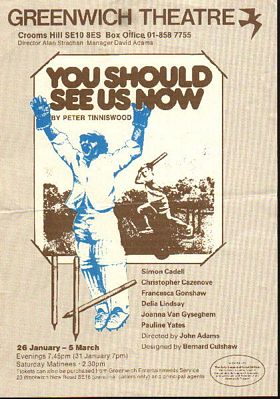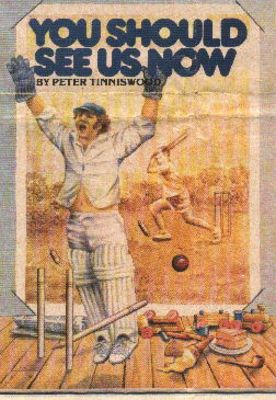YOU SHOULD SEE US NOW by
Peter Tinniswood
Venue: Greenwich 1983
Directed by: John Adams
Venue: Greenwich 1983
Directed by: John Adams


| In 'You Should See Us Now', Graham, his young children expected for the weekend, calls on his friends for support....and the briskly efficient Pamela organises a maelstrom of activities that dismay children and adults alike. But Tinniswood's imaginative skill provides some delightful dramatice twists in this original and highly entertaining play. | |
| Cast | |
| Ernest | Simon Cadell |
| Graham | Christopher Cazenove |
| Kate | Francesca Gonshaw |
| With |
Delia Lindsay Joanna Van Gyseghem Pauline Yates |
“The child is father to the man” may be one of the better known quotations, but whether it is worth going to the trouble of proving it is another matter. Nevertheless, Peter Tinniswood, author of You Should See Us Now at Greenwich, has thought it is, soon running into shallow and becalmed waters once his proposition is under way. It is more effective as an exercise for actors than a comedy, and initially there is a certain amusement in seeing the characters, romantic Graham, bumbling Ernest, bossy Pamela, practical Sheila and shrewish Mrs Mitten, reverting to their childhood selves. But it wears off with dismaying rapidity, and we are left increasingly with a feeling of “so what?”
Oddly enough, however, Peter Tinniswood seems to have caught the flavor of middle-class childhood rather better than the angst of approaching middle-age, as he depicts the agony of an unwanted party, the unsatisfactory aspects of cricket played by both sexes, the desire of pre-pubescent boys to pull down girls’ knickers, the unpleasantness of being in someone else's house. As adults, the people appear far less believable, Graham, deserted by Sheila, searching in almost mystical fashion for the little girl who understood him as a child, Ernest pretending to drive a bus, Pamela with the irresistible need to dominate everybody with whom she comes into contact. The concept of showing them as grown-up children, attractive in theory, fails to work in practice. The point of doing so, once made, proves almost impossible to develop.
Simon Cadell, overplaying Ernest’s trick of falling inertly from his chair, has the evening's most comical moments, the others, Christopher Cazenove, Delia Lindsay, Joanna Van Gyseghem, Pauline Yates and Francesca Gonshaw (as the fantasised Kate) are reduced to showing how fraught life generally is. But there is a splendid composite setting by Bernard Culshaw incorporating the lounge, bedroom, kitchen and garden.